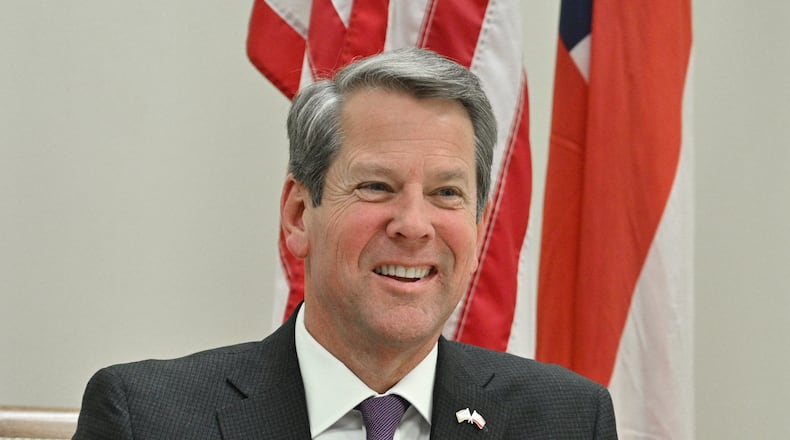The bills signed quietly are always the ones you should read twice.
So take out your readers for Senate Bill 221, the new campaign finance law that passed in the closing days of the Georgia General Assembly’s legislative session and was signed without notice by Gov. Brian Kemp. It goes into effect five weeks from now.
As the AJC’s James Salzer has reported, the measure lets a governor, lieutenant governor, the party nominees for those positions, and Republican and Democratic leaders in the House and Senate create “leadership committees” for campaign fundraising.
Those committees can raise unlimited sums of money from corporations or individuals and then plan their spending with the campaigns of the incumbents or nominees they were raised for. The funds can also be spent on other state contests.
Crucially, the new law won’t apply to everybody. Primary challengers in the governor’s race and in state legislative contests will still operate under the previous campaign finance laws, which prevent campaigns from coordinating with outside groups and keep donation limits in place.
Much of the attention to the new law has focused on two aspects of it. First, lawmakers can now raise money during the 40 days of the legislative session, which had been forbidden for decades. Second, contributions to the committees can be unlimited, while the existing law limits donations to $18,000 from individual donors for statewide races and about $7,000 for legislative races.
Unlimited funds are already allowed in a more limited way for “caucus trusts,” a sort of leadership committee that supports candidates for state House and Senate races around Georgia.
But until now, those trusts and outside committees could not coordinate their activities directly with candidates’ campaigns. With SB 221, they can coordinate their messages, ad buys, and planning as much as they like, a major change for the way campaigns and outside committees have done business in the state up to now.
But more novel, and I think much more consequential, is the language in SB 221 that makes these unlimited, coordinated committee donations legal only for certain candidates, even when they’re running in the same race at the same time.
In essence, there are now two sets of rules in Georgia until primary day in June of 2022. The new, looser rules apply to incumbents, while the old, stricter rules stay in place for everybody else.
The Republican-sponsored bill passed over the objections of Democrats, who slammed it as dumping money into an already cash-soaked political system.
In a floor speech opposing it before it passed, Sen. Jen Jordan, D-Sandy Springs, said it should be called “the Rules Don’t Apply to Us Act,” “the Incumbency Protection Act,” or “the We Should Be Ashamed Act.”
“This is what makes people not trust the system and not trust us,” she said.
I first heard about the bill from a Republican contemplating running as a primary challenger himself, but daunted by the prospect of running against an incumbent in the new world order, with the rules written by the people who had already won.
The law has its origins in the deep anxiety in the GOP that Stacey Abrams, who is expected to run for governor in 2022, will be able to easily amass tens of millions of dollars in campaign cash for her own and other Democrats’ campaigns.
Although Kemp defeated Abrams by 55,000 votes in 2018, her star and status have only risen since then.
In the weeks after losing the election to Kemp, Abrams launched the voting rights group Fair Fight, which in turn spun off the political action committee, Fair Fight Action.
Fair Fight Action has raised nearly $100 million in the two-plus years since she founded it, more than nearly all of the 2020 presidential campaigns, and raised more than $34 million in a single month in 2020.
Abrams has not said definitively what her plans are in 2022, but that hasn’t kept Republicans from doing what they can to get ready to match her fundraising firepower.
In a hypothetical match-up against Kemp, Abrams — or any Democrat who decides to run for governor— will be required to operate under the previous fundraising rules until Georgia’s gubernatorial primary in June of 2022 when they become the official Democratic nominee.
In the meantime, Kemp will be fundraising under the new rules, with unlimited donations allowed for a Kemp-affiliated political organization, which can then coordinate its activities with the Kemp campaign.
And for any Republican looking to challenge Kemp in the GOP primary, the governor will be fundraising under the new rules, while challengers will operate with the existing limits.
The same setup will apply to sitting members of the Legislature in both parties, provided they are on good enough terms with Democratic and Republican caucus leaders to win extra support for their campaigns.
“This bill will enable security for incumbency,” Aunna Dennis, the executive director of Common Cause Georgia, told me. “It really tramples the person who wants to be the community change agent from becoming an elected official through the legislature, because it’s allowing big donors to create war chests for incumbents.”
And Ryan Graham, the chair of the Libertarian Party of Georgia, said that the reality is even worse for third party and independent candidates, who are specifically written out of the law.
“In Georgia, there’s a legal distinction for ‘political party,’ which is essentially a Democrat or Republican,” he explained. “All third parties are considered political bodies by law. So when they use the words ‘political party’ in the law they are, they are excluding us.”
Georgians know from experience that money, and lots of it, is a reality in politics now. But playing by two sets of rules is something new — and too important to keep quiet.
About the Author
Keep Reading
The Latest
Featured




